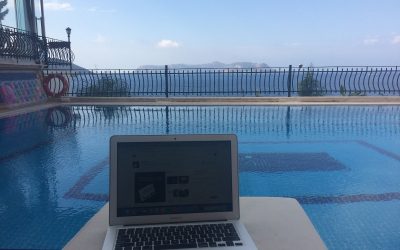It’s 2019, and the life of the freelancer has never been more appealing. As our Instagram feeds are increasingly littered with images of laptops in idyllic locations, all kinds of workers are suddenly dreaming of leaving the office behind forever in favour of a digital nomad lifestyle.
Done right, traveling while you work can be an incredibly rewarding way of taking advantage of the freedom you’re allowed as a freelancer. But being a digital nomad not as easy as it looks on Instagram.
If this is something you’ve wanted to try taking advantage of, here’s my biggest piece of advice: take it slow.
Why travel slowly?
When I started living as a digital nomad, I envisioned myself hopping from place to place every week or so, consistently ticking off my bucket list until there was nothing left in the whole wide world to see.
The reality couldn’t be further from this.
I started out by spending a couple of days in Arequipa, Peru, which went something like this:
- Cafe hopping as I searched for WiFi that was good enough to work with.
- When I finally found a place, I stayed there for the rest of the day, too scared to leave in case I didn’t find good WiFi anywhere else.
- The next morning, I headed straight to the same cafe.
- Soon, I found myself in the cab on the way to the airport, looking around and thinking to myself ‘Oh, this looks like a really nice place’.
From that moment on I realised I needed to stay at least a month in a place to be able to see anything at all.
I needed to embrace slow travel.
The benefits of slow travel for freelancers
Slow travel has been described as a lifestyle, a philosophy, and a new way of travel. It encourages a mindset that focuses on the journey and what the local community has to offer, rather than the sightseeing to-do lists and photo opportunities.
For those who want to travel the world without putting a stop in their careers, slow travel is the perfect way to combine the best of both worlds.
It’s cost effective, prevents burnout, is better for the environment and focuses on making stronger connections with the places you visit.
Let’s dig deeper into some of the benefits.
- You can save money
You can usually save a lot on accommodation by taking a longer-term lease. Particularly if you’re swapping your rent in an expensive city like New York or Sydney for a monthly Airbnb in Thailand or Mexico, you’ll not only be saving money but experiencing a new way of life. You may like to check out sites like Home Exchange for cheaper options.
When you’re going somewhere for a longer period of time, you’ll get more bang for your buck on long haul airfares. Once you’ve paid the expensive airfare, it makes sense to make the most of it by staying a little longer and taking small trips to nearby areas on the weekends. There are plenty more ideas for saving money when you travel slow so do your research — it’ll pay off.
- It’s easier to organise
Usually one of the best parts of traveling is organising and getting ready for your trip. But when you’re working at the same time, planning travel becomes much more burdensome. Not only do you need to think about which country to go and which neighbourhood you want to stay in, you need to think about time differences, getting a sim card, and finding a co-working space. And when there’s work to be done, trying to find a local pharmacy, supermarket or hairdresser becomes a big frustration.
The longer you stay in a place, the less you have to worry about constantly booking the next leg of your journey, giving you more time to enjoy the simple pleasures of really living in another city.
Those who don’t want to handle all the organisation could consider joining a work and travel program like Unsettled. If you’re one of the 30% of remote workers who say a lack of community is the number one challenge to their happiness, you’ll also enjoy the built-in work buddies provided by this kind of program.
- You get to see what it’s like to live local
Staying somewhere for a longer period of time allows you to take part in some of the more ‘everyday’ activities of a place. It may not sound as exciting as visiting the local tourist hotspots, but living in local accommodation, finding your favourite cafe for your morning coffee, and choosing a gym or yoga studio helps you learn more about what life is like for locals — and interact more with the community too.
Things to consider before choosing slow travel as a digital nomad
Slow travel can come in many forms, but whichever way you end up doing it, you should take time to consider whether it’s likely to suit you.
- Ability to do your job
While it sounds like an exciting life, it’s not all about the travel. You have to be able to create value without being physically present with your clients and ensure that they don’t experience a difference while you’re travelling.
Make sure you consider things such as internet connectivity and time zones. Can you realistically organise meetings with your clients in the time zone where you’re going? Is the local area prone to power cuts or slow internet speeds? Being somewhere exotic is not so fun if you’re stressed about not getting your work done. Be sure to have a backup plan for any issues that arise.
- Budget and expenses
While you’re on the road, you’ll need to factor in your everyday expenses such as accommodation, meals and transport. On top of that, there are likely to be some unexpected costs that arise. Be sure to arrange travel insurance to cover some of these, and consider whether there are expenses from home that you can put on hold or cut.
You’ll also want to think about the kind of lifestyle you can have with your budget. At the end of the day you’ll have to compromise on either comfort, lifestyle, or cost, so make sure you’ve weighed up your options and pick the best one for you.
- Productivity and self-motivation
Self-motivation is key when you’re a freelancer no matter where you work, but you’re likely to be tested even more when you’re working from a new location. If you’re anything like me, the potential to get distracted by exciting new places, people, and activities will be huge, and you need to be really committed to saying ‘no’ to things when there’s work to be done.
Will slow travel work for you?
There’s a lot to consider when switching to the digital nomad lifestyle. Make sure you’ve done the research and know what you’re getting yourself into. But at the same time, don’t let information overload stop you from actually making the decision to go. You’ll continue to learn as you go how to make the lifestyle work for you. Over time, you can iterate your slow travel based on your own preferences until you find out how it works for you.

 Sophie McAuley is growth strategist at AND CO from Fiverr, the freelancing software designed to help independent workers manage their businesses from proposal to payment. As a digital nomad, she’s seeking the perfect integration of travel, work and life. She writes about her travels at Vuja De View.
Sophie McAuley is growth strategist at AND CO from Fiverr, the freelancing software designed to help independent workers manage their businesses from proposal to payment. As a digital nomad, she’s seeking the perfect integration of travel, work and life. She writes about her travels at Vuja De View. 
